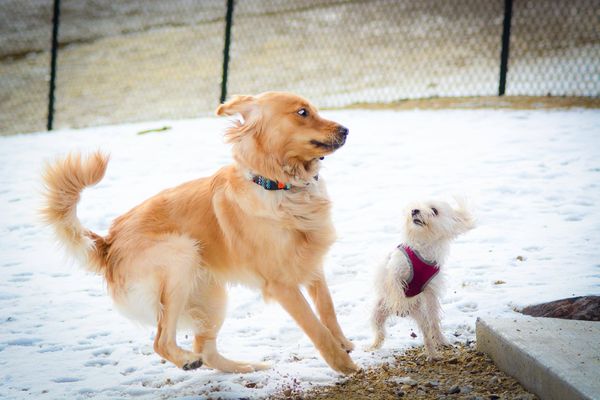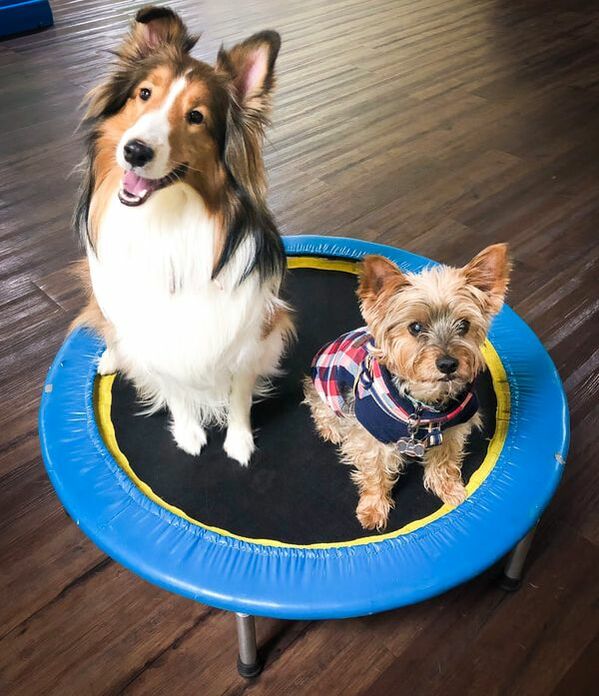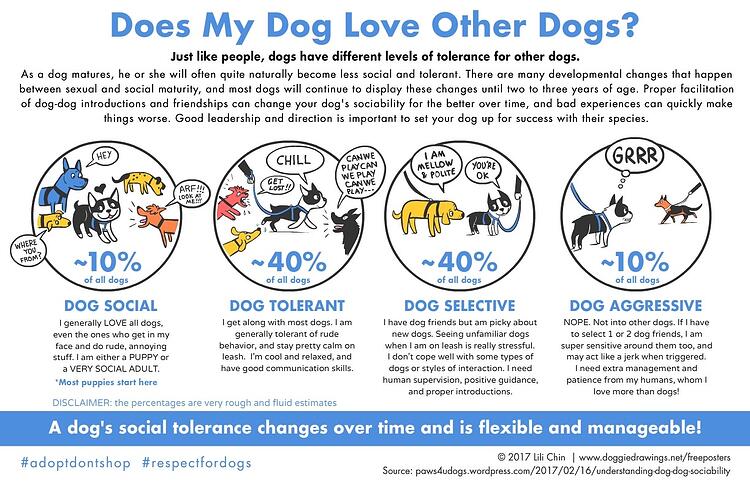Flexi leads are well known for increasing or causing problem behaviors, snapping under tension, causing burns/lacerations and otherwise malfunctioning at the worst possible moment. Your best bet if you have one is to toss it and learn to use a long line and harness instead (which we'll be happy to teach you and your dog how to use if you'd like). But my dog is friendly and loves everyone. Why can't they be off leash? We love that your dog has an outgoing personality. Unfortunately, not every other dog does. Just like people, dogs have a range of personalities and interaction histories. If your dog accidentally runs up to another dog who hasn't had great experiences with other dogs and may think they need to fight for their life, this could end very badly for both dogs. Even if no physical damage is done from an altercation, one or both dogs can come away with multiple behavior problems. These can escalate over time, especially with multiple incidents. Not all people love dogs either. Some are allergic and can't interact with animals safely. Others have trauma and are fearful of animals. And others are just horrible people who hate animals. Just kidding. But for real, it's rude to let your dog run to random people and except everyone to love attention from your dog. For people and dogs who have past trauma with other dogs, just seeing an off leash dog can be trigger. Be mindful that public spaces are there for everyone to enjoy and leashing your dog is the law in those spaces. If there are others around, your off-leash dog may be causing them to feel unsafe. I know we sound like sticks in the mud, but we both love animals and chose to work with them professionally. We both still have some anxiety around off-leash dogs because between the two of us, we've had these experiences from off-leash dogs (as children and adults): - 1 bite to the face - 2 cats killed - 1 bunny killed - chased multiple times when on walk with a toddler - both rushed too many times to count when walking personal and client dogs My dog is really well trained. Why can't they be off leash?
We see this a fair amount. We've seen dogs on all sorts of training tools fail to understand and bolt over to something more exciting (like another dog, a duck pond, someone on a bike, etc). We've seen dogs from other trainers do this. We've seen dogs who have obedience titles do this. There's another part of the equation. To quote a friend, "dogs are basically toddlers with superpowers." You can't always expect them to make the best choices. Even if you've done the work with them. Also, dogs have off/bad days just like people do. Unless you're really tuned into your dog and reading their signals, you may not know if they're capable of the same behaviors, decisions and impulse control they were yesterday. There's no one else nearby and my dog is focused on their toy. Why can't they be off leash?
Why don't people just keep their aggressive dogs at home so everyone else can enjoy places with their dogs off leash then? We get this attitude and mentality a lot. It's a good question with a complicated answer having to do with why dogs are no longer as dog social and dog tolerant as they once were. Gone are the days when people let their family dog out loose to roam the city with other family dogs each day. Our culture and habits have changed and that has effected our canine companions. It would be interesting to go back and study canine behavior and social patterns during those times for sure. But I digress. Today, less than 10% of dogs are truly dog social. Maybe another 40% are dog tolerant. Meaning about 10% of dogs are social butterfly who love almost all dogs and about 40% of dogs tolerate most dogs but would probably be happier doing something else. The rest are either dog selective (which we are seeing more and more of) or dog aggressive (which is not super well-named because it's misleading, but we'll go with that for now). That means that according to today's numbers, HALF of all pet dogs would never be allowed to enjoy public spaces and another 40% would much rather enjoy those public spaces without being constantly pestered by strange dogs. Only 10% would love to run around free and say hi to all the dogs. That's not going to work is it? It's much easier to be considerate and accommodate the needs of the majority of dogs AND people who would enjoy boundaries and consensual interactions.
0 Comments
Leave a Reply. |
Kat & Haylee
Just a couple of animal geeks trying to make the world a better place. Archives
February 2023
Categories
All
|





 RSS Feed
RSS Feed